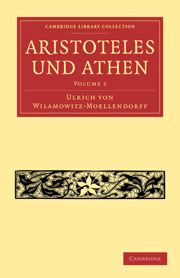Book contents
- Frontmatter
- Contents
- ZWEITES BUCH. Untersuchungen auf grund der aristotelischen Politie
- 1 Die quellen der griechischen geschichte
- 2 Die athenische politie von Kekrops bis Solon
- 3 Die athenische politie von Peisistratos bis Ephialtes
- 4 Πάτϱιoς πολιτεία
- 5 Die könige von Athen
- 6 Trittyen und Demen
- 7 Der athenische name
- 8 Der Areopag vor Ephialtes
- 9 3000 hopliten von Acharnai
- 10 Diobelie
- 11 Tιμήματα παρεχόμενοι
- 12 Λόγος und εὔϑυνα
- 13 Προχειροτovία
- DRITTES BUCH. Beilagen
- Sachregister
5 - Die könige von Athen
Published online by Cambridge University Press: 10 November 2010
- Frontmatter
- Contents
- ZWEITES BUCH. Untersuchungen auf grund der aristotelischen Politie
- 1 Die quellen der griechischen geschichte
- 2 Die athenische politie von Kekrops bis Solon
- 3 Die athenische politie von Peisistratos bis Ephialtes
- 4 Πάτϱιoς πολιτεία
- 5 Die könige von Athen
- 6 Trittyen und Demen
- 7 Der athenische name
- 8 Der Areopag vor Ephialtes
- 9 3000 hopliten von Acharnai
- 10 Diobelie
- 11 Tιμήματα παρεχόμενοι
- 12 Λόγος und εὔϑυνα
- 13 Προχειροτovία
- DRITTES BUCH. Beilagen
- Sachregister
Summary
Über die mythischen könige Athens bedarf es nur weniger worte. auf ihre einordnung in eine liste kommt geschichtlich gar nichts an; die füllfiguren der chronographen sind überhaupt nicht der rede wert. Ogygos ist ein spätling aller orten, eponym der ogygischen, d. h. okeanischen flut, erwachsen aus dem adjectiv ὠγγιος. Amphiktion ist auch nicht von attischem ursprunge, setzt die zugehörigkeit Athens zu der delphischen Amphiktionie voraus und entstammt der abstraction, wenn auch nicht sehr junger. Kranaos ist aus dem adjectivum ϰϱαναός erwachsen, das in nachepischer zeit glossematisch war. Aristophanes nennt Athen selbst nicht nur ϰϱαναὰ πóλις (Ach. 75), sondern geradezu Kϱανααí (Vög. 123). aber schon Aischylos sagt für Aϑηναĩoι παĩδες Kϱαναoῦ (Eum. 1011), Herodotos Kϱαναoí (8, 44). der so entstandene Kranaos halte ein grab in Lamptra (Paus. 1, 31, 3), und ein eponym, der sonst keine gentilicische verbindung hatte, erhielt ihn zum vater, Kϱαναoῦ παĩς' Pãϱoς bei Hesych. Aktaios oder Aktaion ist seinerseits erst von der ὰϰτςή abgeleitet, und da die Athener mit ὰϰτςή nicht ihr ganzes land, sondern die jetzt sog. Peiraieushalbinsel benennen, Attika überhaupt als das ‘vorgebirge’ (das ist ὰϰτςή) nur von dem standpunkte, sei es des seefahrers draussen, sei es des hinterliegenden continentes bezeichnet werden kann, so ist der ursprung dieses namens ausserhalb Athens zu suchen, wie denn auch Aktaios- Aktaion in Attika keine locale oder gentilicische verbindung hat.
- Type
- Chapter
- Information
- Aristoteles und Athen , pp. 126 - 144Publisher: Cambridge University PressPrint publication year: 2010First published in: 1893



